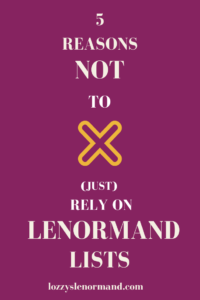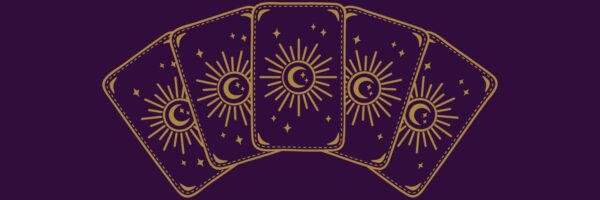 You may have heard me and other Lenormand readers/teachers going on (and on, and on) about not JUST relying on Lenormand lists all the time.
You may have heard me and other Lenormand readers/teachers going on (and on, and on) about not JUST relying on Lenormand lists all the time.
But why? I mean, we put them here, right?
Well, yes, they are incredibly useful to have to hand, especially when you start learning Lenormand and need a quick reference when you’re trying out the layouts for the first time. In fact MOST, of my readers do come here at first precisely because they want the lists that I offer. But if you want to become a confident Lenormand reader you’ll have to, at some point, get ready to move beyond them. And why else would you be here if you didn’t eventually want to get more confident with your readings?
Don’t believe me? Here are 5 reasons why you shouldn’t ONLY rely on Lenormand meaning lists:
1. Lenormand Lists CANNOT Give You Every Possible Meaning for Every Situation
Take the card combination lists that you’ll find here and elsewhere. Without exception, they are illustrative rather than definitive. Lists are provided to you as a guide, a tool to help you in your OWN learning. They are not a Bible and they can’t provide every single possibility. I often get asked for some version of this (“Can you provide more combos for every possible situation?” “Can you do us a book of three-card combos?” “Can you add even more combos to the lists instead of just two or three because it doesn’t fit my situation?”) but my answer is always the same. “No, I’m afraid I can’t.”
Why Not?
Because a lot of the time, that’s a) pretty much impossible, and b) won’t actually help you become a better Lenormand reader. Why?
- Well, bear in mind that even giving just ONE meaning EACH for every single card combination pair gives you a minimum of 1260 meanings in total.
- Most lists you’ll find, online and in books, here or elsewhere, will give you just two or three of the most common meanings for each combination, mainly as illustration in a real-world setting.
- A definitive list that covered every single meaning possibility would need to take account of:
-
- Every possible context you could do the reading in
- Every question any reader, anywhere in the world, and in any situation, could possibly ask the cards
- Every possible culture the reader could be reading in
- Every variation and nuance possible in the 36 individual card meanings (and sometimes additional cards as well.)
-
Can you see why this would be an impossible ask? Almost as impossible as thinking that you need to memorise them all in order to learn the system! (And no, you don’t have to do that either, by the way.)
No Lenormand teacher can, or in my opinion, should even attempt to be spoon-feeding would-be Lenormand readers in that way. For a start, I don’t believe in being a “guru” whose every word (The One True Word of Lozzy!) I expect to hand down and have my loyal acolytes adhering to at all times.
Instead, I’d rather try empower my readers by explaining HOW card meanings, combinations work in my experience, show you the easiest and quickest ways I’ve found to get to grips with the system, and illustrate it with tangible real-world examples wherever I can. That way, you can apply Lenormand as you wish to your own particular situation and your own life—as much or as little as you wish.
Take a look at this post, for instance, on how to come up with your own Lenormand combinations:
How To Make Your Own Lenormand Card Combinations
2. Over-Reliance on Lists Will Stop You Developing As A Lenormand Reader
We all have to start somewhere, and just like riding a bike or learning to swim, when we are just starting, we usually need a bit of support and hand-holding to begin with. In the case of card-reading, particularly, sometimes we also just need a reference very quickly to set us on the right track or check our direction.
BUT the time does come when, just like when we were kids, we have to pull the water-wings off our arms, or the stabilisers off the bike and, in however wobbly a way, push out for ourselves. Otherwise, we’ll never actually learn to be a strong swimmer or be able to cycle around freely wherever we want.
So in my view, it’s the same with Lenormand lists. They are guides, something useful you can hold onto. But they’re not meant to be all there is to it.
To move ahead as a reader, you’ll at some point need to be able to:
- Understand the core essence or energy of each card’s meaning at a glance.
- Be able to come up with combinations yourself fluently, with no need for memorising
- Be able to apply that to readings with more than two cards
- And be able to apply them to the situation, question and context at hand quite naturally and easily, without having to scrabble through the pages of books or search through websites before you can do a single thing.
You can only really start to do this once you liberate yourself from lists. Sometimes, you need to take a breath and just push yourself off. Take a look at these posts to help you:
6 Tips For Getting Confident About Lenormand Card Meanings
Why Context Is Important In Lenormand Readings
3. You Can Get Too Caught Up With Which Lenormand “Person” To Follow—Or Confused If We Have Slightly Different Takes
Another issue that comes up quite a bit is confusion where different readers have slightly different takes, especially on basic card meanings and approaches. You know, you become an “X-Reader Person” or a “Y-Reader person” absolutely wedded to one person’s way of doing things and what they have on their list- when ideally, you should be a YOU-reader person, taking a look around, experimenting, and doing what seems to work best for you in practice
Given we are all different people and personalities, generally we all have slightly different approaches (although you will find that at core most of us broadly say the same things, although there are some outliers). I don’t think anyone holds the One True Key that puts all others in the shade; it’s often more a case of personal preferences.
So just as above, there comes a time when you need to leave the nest to explore a little bit. Again, this starts to come down to both personalising your experience, and getting more confident with the cards. In short, once you have the basics: independence is key.
Try some of these journalling exercises for practice, so you can see how the cards tend to work for you:
Your Lenormand Journal: 5 Exercises To Try
5 Personal Development Exercises For Your Lenormand Journal
Lockdown Lenormand: More Exercises To Try
4. To Become A Confident, Fluent Reader, You must Build Your OWN Relationship With The Cards
Developing good intuition, in particular, really means getting to know your cards at a root “sensing” level. This is almost impossible to do if, for example, when you look at a spread for the first time, instead of taking a few moments to get a feel for it and the cards within it, you immediately rush to look up things in a book or on a website.
It’s not something you’d be able to do if you were giving a live reading, for example.
Now, obviously, this takes practice, and you’re not likely to be able to do it right off the bat. Here are some ways you can build to it gradually.
- Focus on getting to grips with the core underlying meaning, essence or energy of every single card. Not how it applies in this context or that context (you can think about that part later) but try to distill each and every card down to one single thing, one core essence or energy that makes sense to you. It will make applying it to different situations later way, way easier than trying to memorise a billion different things!
- Also focus on how card combinations work, the mechanisms of that, and make sure you know to apply it.
- Always take a good look at a layout before rushing off to look up the meanings of all the combos. Try to work out what it means BEFORE looking it up, and THEN go and check afterwards. You may well be surprised at how much you actually know, and how well you are getting to grips with the cards and the sense of readings over time.
For example, why not practice doing just that with this series of three card readings? Try and read them yourself without checking, then click on my interpretations to see what I thought.
A Month In Lenormand: March 2020
5. Once You “Get” the Basics, It Can Actually Be Easier AND More Accurate NOT to Use Lists So Much
The more readings you do, the more confident and independent you get and the more contexts you start to apply your readings to, the more limiting it can be to just stick to interpretations you find on lists.
Now, obviously keeping things as simple as possible works fine when you are first starting out, in fact, it is often the best thing to do.
But when you get more advanced as a reader, as long as you’re sure of your underlying meanings and how combinations and layouts work, your interpretations will be far more accurate when you are able to apply those meanings yourself to very specific contexts and questions.
Remember, card lists will often give you only the most generalised meanings and interpretations. But as I said at the start, they cannot spoon-feed you every possibility. If you want to become a confident and accurate reader, learning to be independent with Lenormand is key.
10 Ways To Improve The Accuracy of Your Readings
Do You Need More Guidance?
Go to my Lenormand Tips page for more tips about common issues and problems.
Want a reading or not sure about one you’ve done yourself and would like my help in interpreting it? Check out my Personal Readings and Card Interpretation reports!
And if you do want a FREE card combinations PDF E-Book, sign up to my mailing list for weekly newsletters and other freebies (be sure to check ALL your mailboxes to pick it up! And mark me as a safe sender if you don’t want to miss out on stuff.) If you don’t want to sign up, it’s also available in both paperback and ebook format from Amazon as well as other ebook platforms.
Also, my Complete Guide to Lenormand e-book as well as my Love and Careers workbooks are now available from Amazon, Kobo, Barnes & Noble, Apple Books & other ebook platforms and are all also available as downloadable/printable PDFs here in the SHOP!

This is very true. Sometimes, even the “order” of the interpretation of the cards befuddles us, slanting the perspective. Take my example of today’s daily: SUN + RING + SCYTHE. In a glimpse, I obviously thought: cutting my connection to success – something would happen that would sever my bond with anything I deemed happy. Not! It was just a reduction of commitments to make it clear that I could relax and enjoy the day. Lenormand is amazing!